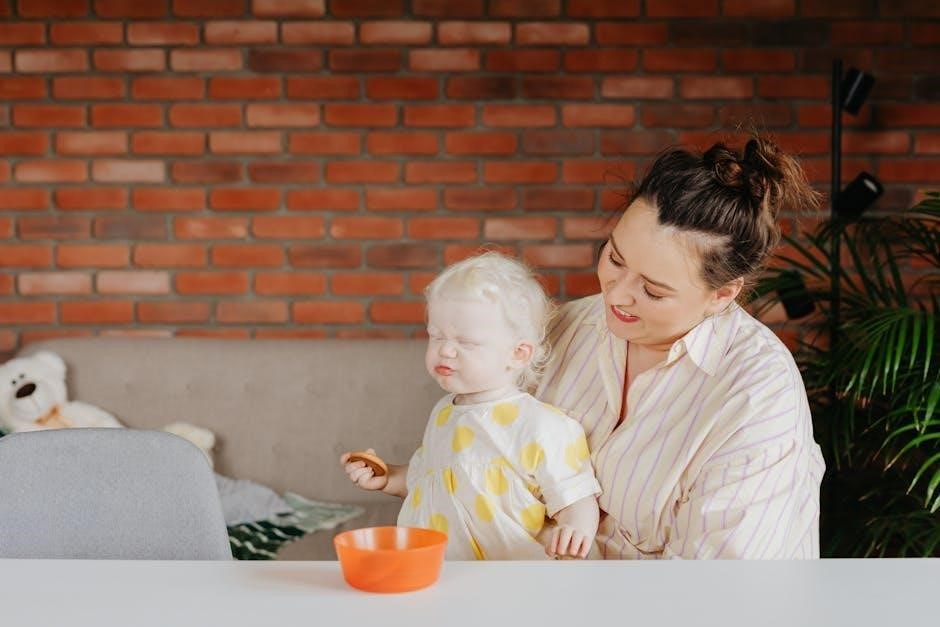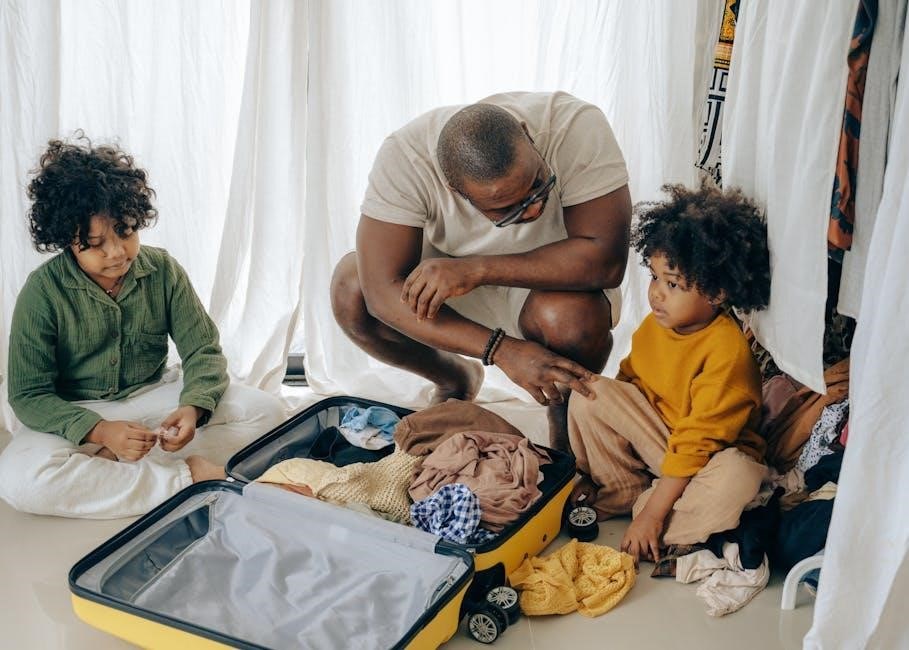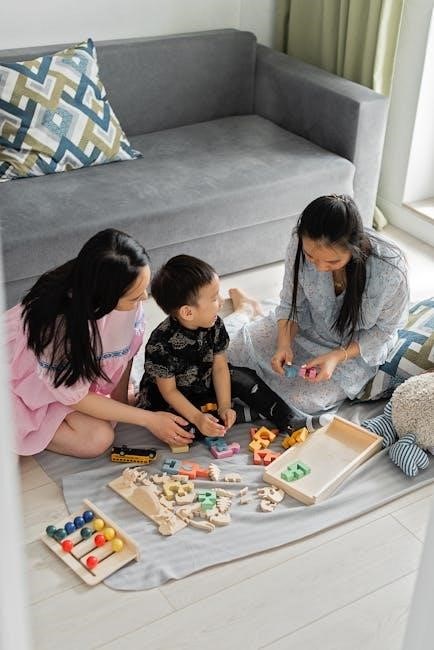Preparation for the Interview
Research the school’s values and programs to align your expectations. Understand the interview format, whether in-person or virtual, and prepare relevant questions. Help your child practice answering confidently and dress appropriately for the occasion.
- Research the institution’s mission and values.
- Review the interview format and requirements.
- Prepare thoughtful questions to ask the interviewer.
- Assist your child in practicing their responses.
Ensure your child is well-rested and dressed professionally to make a positive impression. Role-play potential scenarios to build their confidence and Familiarize them with common interview questions and topics.
1.1 Researching the School or Institution

Understanding the school’s mission, values, and programs is crucial for a successful interview. Research the institution’s academic offerings, extracurricular activities, and support services to align your expectations. Review the school’s website, read reviews, and speak to current families to gain insights. Familiarize yourself with the school’s culture, such as its approach to discipline, diversity, and student well-being. This preparation helps you ask informed questions and demonstrate genuine interest. Additionally, understanding the school’s admission criteria and evaluation process ensures you and your child are well-prepared. Highlighting how your child’s strengths and interests align with the school’s offerings can make a positive impression. This step not only helps you make informed decisions but also shows your commitment to your child’s education and future success.
1.2 Understanding the Interview Format
Understanding the interview format is essential for a smooth and confident experience. Determine whether the interview will be in-person, virtual, or a panel format. Familiarize yourself with the structure, such as the duration, the number of participants, and the types of questions asked. For virtual interviews, ensure your technology is reliable and test it beforehand. If it’s a panel interview, prepare your child to engage with multiple interviewers. Some interviews may include student assessments or activities, so knowing what to expect helps your child feel more at ease. Researching the format also allows you to prepare your child for common scenarios, such as answering behavioral questions or participating in group discussions. Understanding the interview flow ensures you and your child are well-prepared, reducing anxiety and allowing for a more meaningful conversation.
This preparation fosters confidence and helps your child present their best self during the interview.
1.3 Preparing Relevant Questions
Preparing thoughtful questions is crucial for a productive interview. Focus on topics that align with your child’s needs and interests, such as academic support, extracurricular opportunities, and social environments. Avoid asking about readily available information on the school’s website and instead, delve into specifics like teaching philosophies or student well-being initiatives.
- Ask open-ended questions to encourage detailed responses, such as “What support systems are in place for students who need extra help?”
- Inquire about how the school fosters creativity, inclusivity, and character development.
- Explore opportunities for parental involvement and communication channels with teachers.

Involving your child in crafting questions ensures their voice is heard and their concerns addressed. Organize questions by category to stay focused during the interview, ensuring all key areas are covered. This preparation not only demonstrates engagement but also helps in making informed decisions about your child’s education.
1.4 Helping Your Child Prepare
Assisting your child in preparing for the interview is essential for their confidence and success. Encourage them to practice answering potential questions clearly and concisely. Discuss the importance of maintaining eye contact, smiling, and speaking confidently. Role-play scenarios to familiarize them with the interview setting and help them articulate their thoughts effectively.
- Guide your child in researching the school to understand its values and programs.
- Help them gather any necessary materials, such as portfolios or projects, to showcase their achievements.
- Encourage your child to think about their strengths, interests, and goals to communicate them clearly.
- Remind them to dress appropriately and arrive well-rested to make a positive impression.
By fostering a supportive environment, you can help your child feel prepared and confident. Encourage them to ask questions during the interview and engage actively in the conversation. This preparation will not only ease their nerves but also demonstrate their readiness to succeed.

Execution of the Interview
Ensure your child makes a strong first impression by dressing appropriately and maintaining good body language. Encourage active listening and thoughtful responses during the conversation. Follow up with a thank-you note afterward.
- Arrive early to demonstrate punctuality and respect.
- Encourage your child to speak confidently and clearly.
- Remind them to ask questions and show genuine interest.
This approach helps create a positive and professional atmosphere during the interview, showcasing your child’s readiness and enthusiasm.
2.1 Making a Positive First Impression
Making a positive first impression is crucial for your child’s interview success. Ensure they dress appropriately, maintaining a neat and professional appearance. Encourage them to arrive early, demonstrating punctuality and respect. Remind them to greet the interviewer with a firm handshake and a polite smile, showing confidence and friendliness.

- Dress in attire that aligns with the school’s culture or interview expectations.
- Encourage your child to maintain good posture and eye contact during the meeting.
- Role-play scenarios to help them practice greeting and introducing themselves confidently.
- Emphasize the importance of being polite and respectful throughout the interaction.
By focusing on these details, your child can create a lasting positive impression, setting the tone for a successful interview. Ensure they understand that first impressions reflect their readiness and enthusiasm for the opportunity.

2.2 Engaging in Meaningful Conversation
Engaging in meaningful conversation during the interview is essential for showcasing your child’s personality and interests. Encourage them to listen actively and respond thoughtfully to questions. Teach them to articulate their thoughts clearly and confidently, avoiding overly rehearsed answers. Remind them to ask prepared questions, demonstrating curiosity and genuine interest in the school or program.
- Encourage your child to share personal experiences and achievements relevant to the conversation.
- Role-play active listening skills, such as nodding and summarizing what the interviewer says.
- Help them practice answering common interview questions using specific examples.
- Emphasize the importance of maintaining a positive and enthusiastic tone throughout the discussion.
By fostering open and engaging dialogue, your child can build a connection with the interviewer, highlighting their uniqueness and suitability for the opportunity. Ensure they stay focused and responsive, making the conversation meaningful and memorable.
2.4 Following Up After the Interview
Following up after the interview is a crucial step that demonstrates professionalism and gratitude. Ensure your child sends a thank-you note or email within 24 hours, expressing appreciation for the opportunity and reiterating their interest in the school or program. This gesture not only leaves a positive impression but also reinforces their enthusiasm.

- Suggest your child write a heartfelt thank-you message, mentioning specific topics discussed during the interview.
- Encourage them to highlight how the school aligns with their goals and aspirations.
- Remind them to proofread the message for clarity and grammar before sending it.
- If the school provides additional instructions for follow-up, ensure your child adheres to them promptly.
Effective follow-up shows respect for the interviewer’s time and reinforces your child’s commitment to the opportunity. Encourage them to stay patient and professional while awaiting a response.

After the Interview

Discuss the interview outcome with your child, reflecting on their experience and any concerns. Offer support and guidance, whether celebrating success or addressing areas for improvement. Encourage open dialogue to help them process their feelings and prepare for the next steps.
- Reflect on the interview experience together.
- Address any concerns or questions your child may have.
- Provide reassurance and constructive feedback.
Open communication will help your child feel supported, regardless of the interview’s outcome.
3.1 Discussing the Outcome with Your Child
After the interview, take time to discuss the outcome with your child, fostering open and honest communication. Encourage them to share their feelings, whether they felt confident or nervous, and listen attentively to their perspective. Acknowledge their efforts and highlight their strengths, while gently addressing any areas for improvement. This conversation is crucial for helping your child process their experience and gain valuable insights for future interviews.
- Encourage your child to express their thoughts and feelings about the interview.
- Offer positive reinforcement and constructive feedback.
- Discuss next steps, whether it’s preparing for further interviews or reflecting on the process.
This dialogue not only supports your child’s emotional well-being but also helps them grow from the experience, fostering resilience and confidence for future endeavors.
